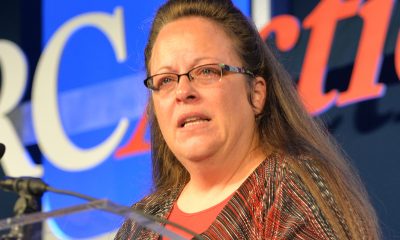National
Romney, in his own (contradictory) words
GOP frontrunner’s tortured history on LGBT rights

Republican frontrunner Mitt Romney has been criticized as a flip-flopper during his presidential campaign — and although he’s defended himself against accusations that his positions have pivoted on LGBT rights, his record shows that he’s also changed on these issues.
During a Dec. 15 debate in Sioux City, Iowa, when Fox News moderator Chris Wallace said Romney has changed his positions in the last 10 years on abortion, gay rights and gun control, the candidate took exception to this list and said his positions have been consistent on gay rights.
“I’m firmly in support of people not being discriminated against based upon their sexual orientation,” Romney said. “At the same time, I oppose same-sex marriage. That’s been my position from the beginning.”
But an examination of Romney’s previous statements reveals any assertion that he’s held the same positions on LGBT rights — including opposition to same-sex marriage — since the beginning of his political career is false.
From marriage to “Don’t Ask, Don’t Tell” to civil unions to the Employment Non-Discrimination Act, Romney’s positions have wildly changed as he has pursued different offices and public opinion has grown to support LGBT issues.
Most of Romney’s earlier pro-LGBT positions can found in a 1994 letter that he wrote while running as a U.S. Senate candidate in Massachusetts against the late Sen. Edward Kennedy. In the missive, Romney boasted he could go further on gay rights than Kennedy, saying “I will provide more effective leadership than my opponent.”
“If we are to achieve the goals that we share, we must make, we must make equality for gays and lesbians a mainstream concern,” Romney said. “My opponent cannot do this. I can and will.”
Romney pledged to co-sponsor a version of ENDA, and if possible to expand the measure to include housing and credit. The then-Senate candidate also called “Don’t Ask, Don’t Tell,” which had been recently signed into law by former President Clinton, a first step in a process that will “ultimately lead to gays and lesbians being able to serve openly and honestly in our nation’s military.”
But prior to the 2008 election when Romney began pursuing his presidential ambitions, his support for employment non-discrimination legislation and open service vanished.
For example, in a 2006 interview with the National Journal, Romney said when asked about his previous support for that he doesn’t “see the need for new or special legislation” because passage of the bill would open a floodgate of litigation.
In 2007, Romney said during a presidential debate he “was wrong” in thinking “Don’t Ask, Don’t Tell” was a silly idea and said “it seems to be working.” The candidate continued to say repeal would be “a social experiment” and that he “wouldn’t change it” during a time of war.
Asked again during his current campaign about “Don’t Ask, Don’t Tell” during an editorial board meeting with the Des Moines Register in December, Romney pivoted again, saying he’s “not planning on reversing” open service now that wars are over.
Even on marriage, Romney has changed in his opposition to gay nuptials. In an interview with Bay Windows in 1994, Romney said marriage is “a state issue as you know – the authorization of marriage on a same-sex basis falls under state jurisdiction.”
But that position changed after the Massachusetts Supreme Court under his watch as governor legalized same-sex marriage, prompting him to call for a Federal Marriage Amendment.
Still, his vision for a U.S. constitutional amendment banning same-sex marriage has changed even over the course of his current campaign. In an August debate, Romney said marriage isn’t “an activity that goes on within the walls of a state” and said it “should be constant across the country.”
But in a December interview with the Boston Herald, Romney said his vision of a Federal Marriage Amendment would allow existing same-sex marriages to remain intact.
“I think it would keep intact those marriages which had occurred under the law but maintain future plans based on marriage being between a man and a woman,” Romney said.
That vision of allowing states to maintain existing same-sex marriages would, at least temporarily, result in varying laws with respect to marriage for state throughout the country.
LGBT rights groups on the right and left said Romney’s varied positions on LGBT rights demonstrates either a lack of character or his willingness to reconsider his views on the issues depending on the political alignment of the organization.
Jimmy LaSalvia, executive director of the gay conservative group GOProud, commended Romney for repeatedly speaking out against discrimination in debates, despite his changing positions on LGBT issues.
“He’s been consistent in his opposition to discrimination,” said LaSalvia, who’s endorsed Romney. “He has a record of hiring gay people, and, as governor, he appointed gay people to high-level positions.”
Jerame Davis, executive director of the National Stonewall Democrats, said Romney’s varied positions on LGBT rights demonstrates Romney “clearly has no moral compass and will say anything to get elected.”
“The only thing Mitt Romney stands for is Mitt Romney,” Davis said. “On issue after issue — LGBT or otherwise — he has pandered to the least common denominator and allowed the political winds to guide his every word.”
A roundup of Romney’s statements on LGBT issues follows:
On the Employment Non-Discrimination Act
In a 1994 letter to Log Cabin Republicans, Romney said he would co-sponsor ENDA:
“We have discussed a number of important issues such as the Federal Employment Non-Discrimination Act (ENDA), which I have agreed to co-sponsor, and if possible broaden to housing and credit.”
In a 2006 interview with National Review Online, Romney said he no longer supports ENDA:
“I don’t see the need for new or special legislation. My experience over the past several years as governor has convinced me that ENDA would be an overly broad law that would open a litigation floodgate and unfairly penalize employers at the hands of activist judges.”
In a 2007 interview on “Meet the Press,” Romney said ENDA-like laws should be left to the states:
“At the state level, I think it makes sense for states to put in provision of this. I would not support at the federal level, and I changed in that regard because I think that policy makes more sense to be implemented at the state level. If you’re looking for someone who’s never changed any positions on any policies, then I’m not your guy. I learn from experience.”
On ‘Don’t Ask, Don’t Tell’
In a 1994 letter to Log Cabin Republican, Romney called “Don’t Ask” a transitional policy that would lead to open service:
“One issue I want to clarify concerns President Clinton’s ‘Don’t Ask, Don’t Tell, Don’t Pursue’ military policy. I believe that Clinton’s compromise was a step in the right direction. I am also convinced that it is the first of a number of steps that will ultimately lead to gays and lesbians being able to serve openly and honestly in our nation’s military.”
In a 2007 GOP debate at Saint Anselm College, Romney said “Don’t Ask” was working:
“When I first heard of the ‘Don’t Ask, Don’t Tell’ policy, I thought it sounded awfully silly. I didn’t think that would be very effective. And I turned out to be wrong. It’s been the policy now in the military for what, 10, 15 years, and it seems to be working. This is not the time to put in place a major change, a social experiment, in the middle of a war going on. I wouldn’t change it at this point.”
In a June 2011 debate in New Hampshire:
“I believe it should have been kept in place until conflict was over.”
In 2011, he spoke about open service with the Des Moines Register:
“That’s already occurred and I’m not planning on reversing that at this stage. … I was not comfortable making the change during a period of conflict, by virtue of the complicating features of a new program in the middle of two wars going on, but those wars are winding down and moving in that direction at this stage no longer presents that problem.”
On civil unions
From a 2003 document found on the governor’s old website:
A day after the Supreme Judicial Court decision, Gov. Romney told reporters that he believed a civil unions statute would “be sufficient” to satisfy the justices’ concerns. Joining Romney in the call for civil unions legislation was Rep. Eugene O’Flaherty, chair of the House Committee on the Judiciary.
In a 2005 interview with Chris Matthews on MSNBC’s “Hardball” on the difference between civil unions and marriage:
“I’d rather have neither to tell you the truth. I’d rather have domestic partnership benefits, such as hospital visitation rights for same-sex couples. I don’t want civil unions or gay marriage, but there is a difference. Even with just the word, there’s a difference.”
In 2012, a Romney campaign spokesperson reaffirmed the candidate’s opposition to civil marriage:
“[H]e has not been in favor of civil unions, if by civil unions you mean the equivalency to marriage but without the name marriage. What he has favored, and he talked about this, I believe, last night, was a form of domestic partnership or a contractual relationship with reciprocal benefits.”
On LGBT Pride
Text from 2002 Pride flier from Romney’s gubernatorial campaign:
“Mitt and Kerry wish you a great Pride weekend. All citizens deserve equal rights, regardless of their sexual preference.”
In 2012, Romney’s campaign disavowed the letter:
“I don’t know where those pink fliers came from. I was the communications director on the 2002 campaign. I don’t know who distributed them … I never saw them and I was the communications director,” Eric Fehrnstrom said.
On same-sex marriage
Romney in 1994 to gay newspaper Bay Windows:
Same-sex marriage is “a state issue as you know – the authorization of marriage on a same-sex basis falls under state jurisdiction.”
In 2004 testimony before Congress:
I join with those who support a federal constitutional amendment. Some retreat from the concept of amendment, per se. While they say they agree with the traditional definition of marriage, they hesitate to amend. But amendment is a vital and necessary aspect of our constitutional democracy, not an aberration.
In an August 2011 debate:
“Marriage should be decided at the federal level. You might wonder, why is that? Why wouldn’t you just let each state make their own decision? And the reason is, people move from state to state of course in a society like ours. … Marriage is a status; it’s not an activity that goes on within the walls of a state. And as a result, our marriage-status relationship should be constant across the country. I believe we should have a federal amendment to the constitution that defines marriage as a relationship between a man and a woman.”
In a December 2011 interview with the Boston Herald:
Romney expressed support for a constitutional amendment that could create a complex three-tier system of marriage —maintaining marriage rights for straight couples, allowing gays who have already married to remain married, but barring future same-sex marriages.
“I think it would keep intact those marriages which had occurred under the law but maintain future plans based on marriage being between a man and a woman,” Romney said.
In 2011 he told the Des Moines Register:
“I would like to see a national amendment defining marriage as a relationship between a man and a woman. But that was tried maybe three or four years ago. I don’t think that’s likely to receive the necessary support, at least in the near term.”
During a January 2012 debate:
Romney said he’ll advocate for “full rights” for gay people, although he said he remains opposed to same-sex marriage.
“If people are looking for someone who will discriminate against gays or will in any way try and suggest that people — that have different sexual orientation don’t have full rights in this country, they won’t find that in me,” Romney said.

President Donald Trump on Wednesday signed a bill that reopens the federal government.
Six Democrats — U.S. Reps. Jared Golden (D-Maine), Marie Gluesenkamp Perez (D-Wash.), Adam Gray (D-Calif.), Don Davis (D-N.C.), Henry Cuellar (D-Texas), and Tom Suozzi (D-N.Y.) — voted for the funding bill that passed in the U.S. House of Representatives. Two Republicans — Thomas Massie (R-Ky.) and Greg Steube (R-Fla.) — opposed it.
The 43-day shutdown is over after eight Democratic senators gave in to Republicans’ push to roll back parts of the Affordable Care Act. According to CNBC, the average ACA recipient could see premiums more than double in 2026, and about one in 10 enrollees could lose a premium tax credit altogether.
These eight senators — U.S. Sens. Catherine Cortez Masto (D-Nev.), Dick Durbin (D-Ill.), John Fetterman (D-Pa.), Maggie Hassan (D-N.H.), Tim Kaine (D-Va.), Angus King (I-Maine), Jacky Rosen (D-Nev.), and Jeanne Shaheen (D-N.H.) — sided with Republicans to pass legislation reopening the government for a set number of days. They emphasized that their primary goal was to reopen the government, with discussions about ACA tax credits to continue afterward.
None of the senators who supported the deal are up for reelection.
King said on Sunday night that the Senate deal represents “a victory” because it gives Democrats “an opportunity” to extend ACA tax credits, now that Senate Republican leaders have agreed to hold a vote on the issue in December. (The House has not made any similar commitment.)
The government’s reopening also brought a win for Democrats’ other priorities: Arizona Congresswoman Adelita Grijalva was sworn in after a record-breaking delay in swearing in, eventually becoming the 218th signer of a discharge petition to release the Epstein files.
This story is being updated as more information becomes available.
U.S. Military/Pentagon
Serving America, facing expulsion: Fight for trans inclusion continues on Veterans Day
Advocates sue to reverse Trump ban while service members cope with new struggles

President Trump signed EO 14183, titled “Prioritizing Military Excellence and Readiness,” on Jan. 27, directing the Department of Defense (DoD) to adopt policies that would prohibit transgender, nonbinary, and gender-nonconforming people from serving in the military.
The Trump-Vance administration’s policy shift redefines the qualifications for military service, asserting that transgender people are inherently incapable of meeting the military’s “high standards of readiness, lethality, cohesion, honesty, humility, uniformity, and integrity,” citing a history or signs of gender dysphoria. According to the DoD, this creates “medical, surgical, and mental health constraints on [an] individual.” Regardless of their physical or intellectual capabilities, transgender applicants are now considered less qualified than their cisgender peers.
On Jan. 28, 2025, GLBTQ Legal Advocates and Defenders (GLAD) Law and the National Center for LGBTQ Rights (NCLR) filed Talbott v. Trump, a federal lawsuit in the U.S. District Court for the District of Columbia challenging the executive order. Originally filed on equal protection grounds on behalf of six active service members and two individuals seeking enlistment, the case has since grown to include 12 additional plaintiffs.
The Washington Blade spoke exclusively with Second Lt. Nicolas (Nic) Talbott, U.S. Army, a plaintiff in the case, and with Jennifer Levi, Senior Director of Transgender and Queer Rights at GLAD Law, who is leading the litigation.
For Talbott, serving in the military has been a lifelong aspiration, one he pursued despite the barriers posed by discriminatory policies.
“Being transgender posed quite the obstacle to me achieving that dream,” Talbott told the Blade. “Not because it [being trans] had any bearing on my ability to become a soldier and meet the requirements of a United States soldier, but simply because of the policy changes that we’ve been facing as transgender service members throughout the course of the past decade… My being transgender had nothing to do with anything that I was doing as a soldier.”
This drive was fueled by early life experiences, including the impact of the Sept. 11 terrorist attacks, which shaped his desire to protect his country.
“Even for an eight-year-old kid, [9/11] has a tremendous amount of impact… I remember thinking, you know, this is a terrible thing. Me, and when I grow up, I want to make sure nothing like this ever happens again,” he said. “I’ve still tried to gear my life in a way that I can be preparing myself to eventually help accomplish that mission of keeping America safe from anything like that ever happening again.”
The attacks inspired countless Americans to enlist; according to the New York City government, 181,510 joined active duty and 72,908 enlisted in the reserves in the year following 9/11. Although Talbott was too young to serve at the time, the events deeply influenced his educational and career path.
“For me, [9/11] just kind of helped shape my future and set me on the path that I’m currently on today,” he added. “It ignited my passion for the field, and it’s something that you know, I’ve carried with me into my adult life, into my professional life, and that I hope to have a career in the future.”
Talbott holds a master’s degree in criminology with a focus on counterterrorism and global security, and while completing his degree, he gained practical experience working with the Transportation Security Administration.
Despite the public scrutiny surrounding the lawsuit and the ongoing uncertainty of his military future, Talbott remains grounded in the values that define military service.
“Being so public about my involvement with this lawsuit grants me the very unique opportunity to continue to exemplify those values,” Talbott said. “I’m in a very privileged spot where I can speak relatively openly about this experience and what I’m doing. It’s very empowering to be able to stand up, not only for myself, but for the other transgender service members out there who have done nothing but serve with honor and dignity and bravery.”
The ban has created significant uncertainty for transgender service members, who now face the possibility of separation solely because of their gender identity.
“With this ban… we are all [trans military members] on track to be separated from the military. So it’s such a great deal of uncertainty… I’m stuck waiting, not knowing what tomorrow might bring. I could receive a phone call any day stating that the separation process has been initiated.”
While the Department of Defense specifies that most service members will receive an honorable discharge, the policy allows for a lower characterization if a review deems it warranted. Compensation and benefits differ depending on whether service members opt for voluntary or involuntary separation. Voluntary separation comes with full separation pay and no obligation to repay bonuses, while involuntary separation carries lower pay, potential repayment of bonuses, and uncertain success in discharge review processes.
Healthcare coverage through TRICARE continues for 180 days post-discharge, but reduced benefits, including VA eligibility, remain a concern. Those with 18–20 years of service may qualify for early retirement, though even this is not guaranteed under the policy.
Talbott emphasized the personal and professional toll of the ban, reflecting on the fairness and capability of transgender service members.
“Quite frankly, the evidence that we have at hand points in the complete opposite direction… there are no documented cases that I’m aware of of a transgender person having a negative impact on unit cohesion simply by being transgender… Being transgender is just another one of those walks of life.”
“When we’re losing thousands of those qualified, experienced individuals… those are seats that are not just going to be able to be filled by anybody … military training that’s not going to be able to be replaced for years and years to come.”
Talbott also highlighted the unique discipline, dedication, and value of diversity that transgender service members bring—especially in identifying problems and finding solutions, regardless of what others think or say. That, he explained, was part of his journey of self-discovery and a key reason he wants to continue serving despite harsh words of disapproval from the men leading the executive branch.
“Being transgender is not some sad thing that people go through… This is something that has taken years and years and years of dedication and discipline and research and ups and downs to get to the point where I am today… my ability to transition was essential to getting me to that point where I am today.”
He sees that as an asset rather than a liability. By having a more diverse, well-rounded group of people, the military can view challenges from perspectives that would otherwise be overlooked. That ability to look at things in a fresh way, he explained, can transform a good service member into a great one.
“I think the more diverse our military is, the stronger our military is… We need people from all different experiences and all different perspectives, because somebody is going to see that challenge or that problem in a way that I would never even think of… and that is what we need more of in the U.S. military.”
Beyond operational effectiveness, Talbott emphasized the social impact of visibility and leadership within the ranks. Fellow soldiers often approached him for guidance, seeing him as a trusted resource because of his transgender status.
“I can think of several instances in which I have been approached by fellow soldiers… I feel like you are a person I can come to if I have a problem with X, Y or Z… some people take my transgender status and designate me as a safe person, so to speak.”
With the arrival of Veterans Day, the Blade asked what he wishes the public knew about the sacrifices of transgender service members. His answer was modest.
“Every person who puts on the uniform is expected to make a tremendous amount of sacrifice,” Talbott said. “Who I am under this uniform should have no bearing on that… We shouldn’t be picking and choosing which veterans are worthy of our thanks on that day.”
Jennifer Levi, GLAD Law’s Senior Director of Transgender and Queer Rights, also spoke with the Blade and outlined the legal and human consequences of the ban. This is not Levi’s first time challenging the executive branch on transgender rights; she led the legal fight against the first Trump administration’s military ban in both Doe v. Trump and Stockman v. Trump.
Levi characterized the policy as overtly cruel and legally indefensible.
“This policy and its rollout is even more cruel than the first in a number of ways,” Levi explained. “For one, the policy itself says that transgender people are dishonest, untrustworthy and undisciplined, which is deeply offensive and degrading and demeaning.”
She highlighted procedural abuses and punitive measures embedded in the policy compared to the 2017 ban.
“In the first round the military allowed transgender people to continue to serve… In this round the military policy purge seeks to purge every transgender person from military service, and it also proposes to do it in a very cruel and brutal way, which is to put people through a process… traditionally reserved for kicking people out of the military who engaged in misconduct.”
Levi cited multiple examples of discrimination, including the revocation of authorized retirements and administrative barriers to hearings.
She also explained that the administration’s cost argument is flawed, as removing and replacing transgender service members is more expensive than retaining them.
“There’s no legitimate justification relating to cost… it is far more expensive to both purge the military of people who are serving and also to replace people… than to provide the minuscule amount of costs for medications other service members routinely get.”
On legal grounds, Levi noted the ban violates the Equal Protection Clause.
“The Equal Protection Clause prevents laws that are intended to harm a group of people… The doctrine is rooted in animus, which means a bare desire to harm a group is not even a legitimate governmental justification.”
When asked what she wishes people knew about Talbott and other targeted transgender military members, Levi emphasized their extraordinary service.
“The plaintiffs that I represent are extraordinary… They have 260 years of committed service to this country… I have confidence that ultimately, this baseless ban should not be able to legally survive.”
Other organizations have weighed in on Talbott v. Trump and similar lawsuits targeting transgender service members.
Human Rights Campaign Foundation President Kelley Robinson criticized the ban’s impact on military readiness and highlighted the counterintuitive nature of removing some of the country’s most qualified service members.
“Transgender servicemembers serve their country valiantly, with the same commitment, the same adherence to military standards and the same love of country as any of their counterparts,” Robinson said. “This ban by the Trump administration, which has already stripped transgender servicemembers of their jobs, is cruel, unpatriotic, and compromises the unity and quality of our armed forces.”
Lambda Legal Senior Counsel Sasha Buchert echoed the legal and moral imperative to reverse the policy.
“Every day this discriminatory ban remains in effect, qualified patriots face the threat of being kicked out of the military,” she said. “The evidence is overwhelming that this policy is driven by animus rather than military necessity… We are confident the court will see through this discriminatory ban and restore the injunction that should never have been lifted.”
The White House
Trump targets LGBTQ workers in new loan forgiveness restrictions
A new Trump policy attempts to limit loan forgiveness for federal workers working with LGBTQ issues.

The Trump-Vance administration is moving forward with plans to restrict federal workers from using the Public Service Loan Forgiveness (PSLF) program if their work involves issues related to LGBTQ individuals, immigrants, or transgender children.
Lawsuits were filed last week in more than 20 cities — including Albuquerque, N.M., Boston, Chicago, and San Francisco — challenging the administration’s efforts to withhold loan forgiveness from organizations that oppose the president and his party’s political agenda.
Created by Congress in 2007 and signed into law by then-President George W. Bush, PSLF cancels the federal student loan debts of borrowers who spend a decade or more working in public service. The program covers teachers, nurses, law enforcement officers (including members of the military), and employees of tax-exempt organizations under Section 501(c)(3). Many of those who work to support LGBTQ rights are employed by such organizations — meaning they stand to lose eligibility under the new policy.
As of 2024, more than 1 million Americans have benefited from PSLF, helping erase an estimated $74 billion in student loan debt, according to a Biden-era estimate.
Under the new rule, which takes effect July 1, 2026, the Department of Education will be able to deny loan forgiveness to workers whose government or nonprofit employers engage in activities deemed to have a “substantial illegal purpose.” The power to define that term will rest not with the courts, but with the education secretary.
The rule grants the secretary authority to exclude groups from the program if they participate in activities such as trafficking, illegal immigration, or what it calls the “chemical castration” of children — defined as the use of hormone therapy or puberty-blocking drugs, a form of gender-affirming care sometimes provided to transgender children and teens.
Under Secretary of Education Nicholas Kent defended the change, arguing that the new rule would better serve the American people, despite every major American physician organization research showing gender-affirming care helps more than it harms.
“It is unconscionable that the plaintiffs are standing up for criminal activity,” Kent said in a statement to NPR. “This is a commonsense reform that will stop taxpayer dollars from subsidizing organizations involved in terrorism, child trafficking, and transgender procedures that are doing irreversible harm to children.”
The Williams Institute, a leading research center on sexual orientation and gender identity law and public policy, warned that this — along with other restrictions on federal loan forgiveness — would disproportionately harm LGBTQ Americans. The institute found that more than one-third (35%) of LGBTQ adults aged 18 to 40 — an estimated 2.9 million people — hold over $93.2 billion in federal student loans. About half (51%) of transgender adults, 36% of cisgender LBQ women, and 28% of cisgender GBQ men have federal student loans.
“The proposed restrictions on student loans will particularly affect the nearly one-quarter of LGBTQ adults employed in the public or nonprofit sectors, which qualify for the Public Student Loan Forgiveness program,” said Brad Sears, Distinguished Senior Scholar of Law and Policy at the Williams Institute, who authored a brief on how the proposed changes could impact LGBTQ borrowers. “A recent executive order could potentially disqualify anyone working for an organization involved in gender-affirming care, or possibly those serving transgender individuals more broadly, from the PSLF program.”
-

 U.S. Supreme Court3 days ago
U.S. Supreme Court3 days agoSupreme Court rejects Kim Davis’s effort to overturn landmark marriage ruling
-

 District of Columbia3 days ago
District of Columbia3 days agoCapital Pride files anti-stalking complaint against local LGBTQ activist
-

 Movies5 days ago
Movies5 days agoSuperb direction, performances create a ‘Day’ to remember
-

 Theater4 days ago
Theater4 days agoAstounding ‘LIZZIE’ builds on legendary axe murder tale



















